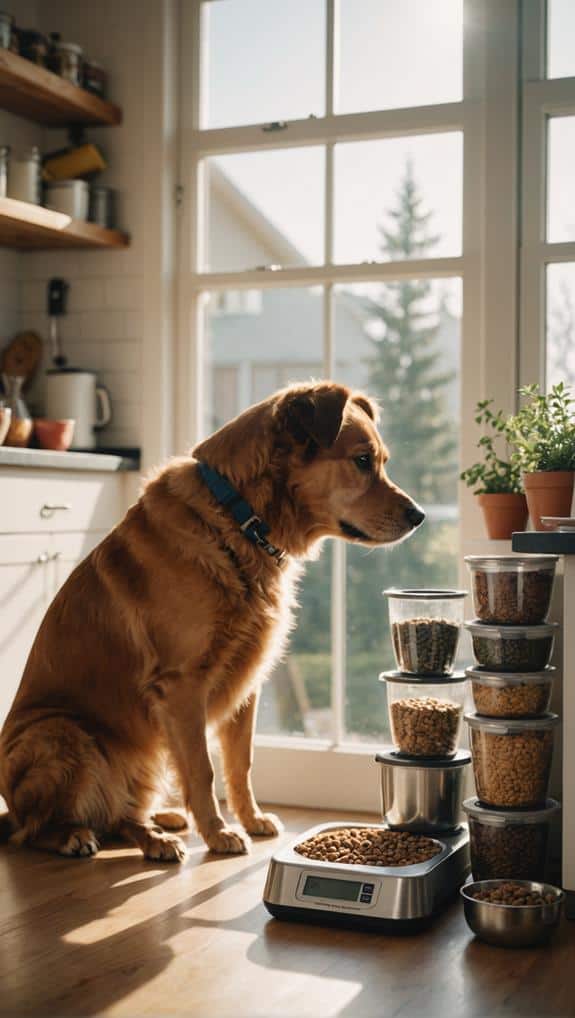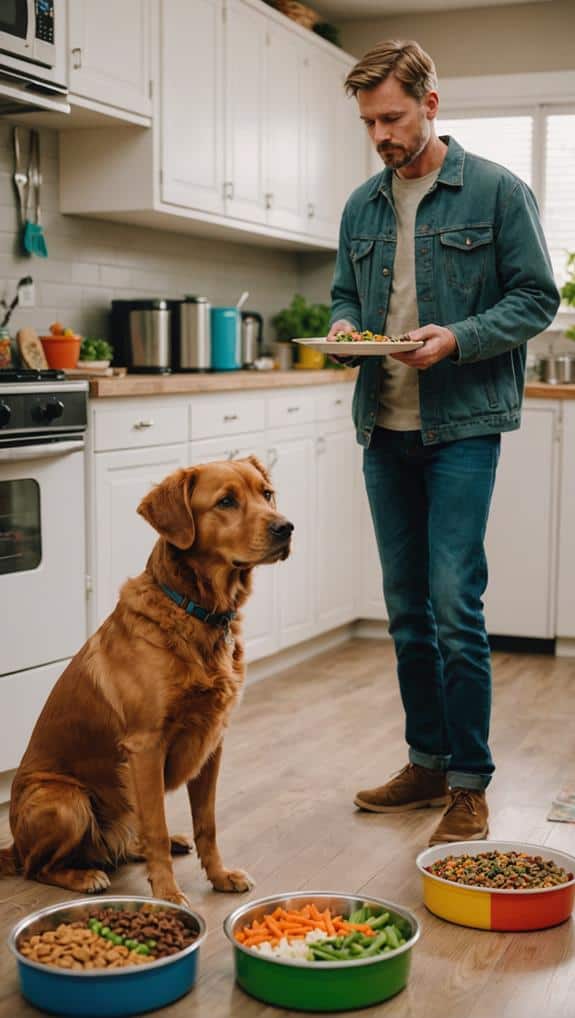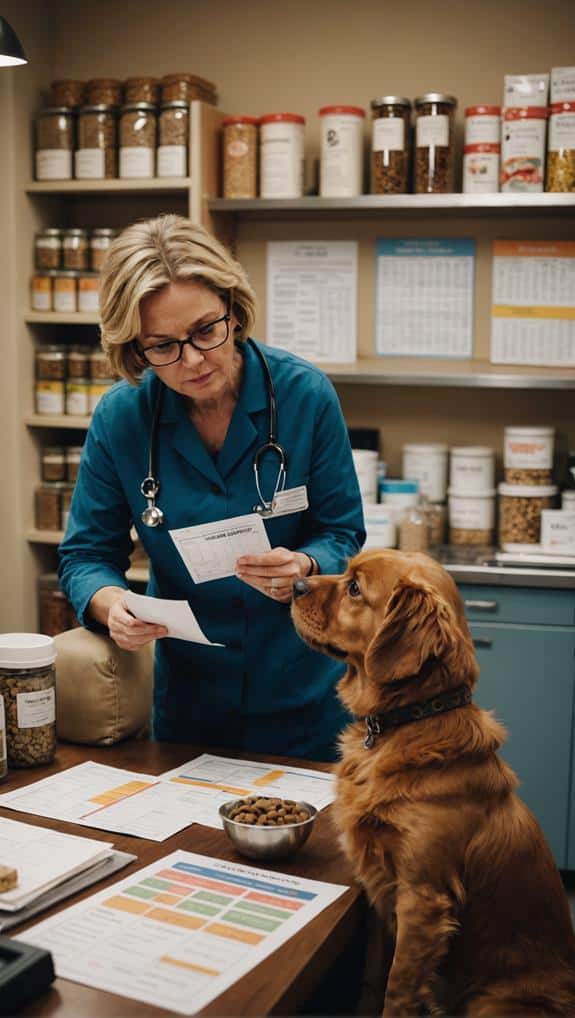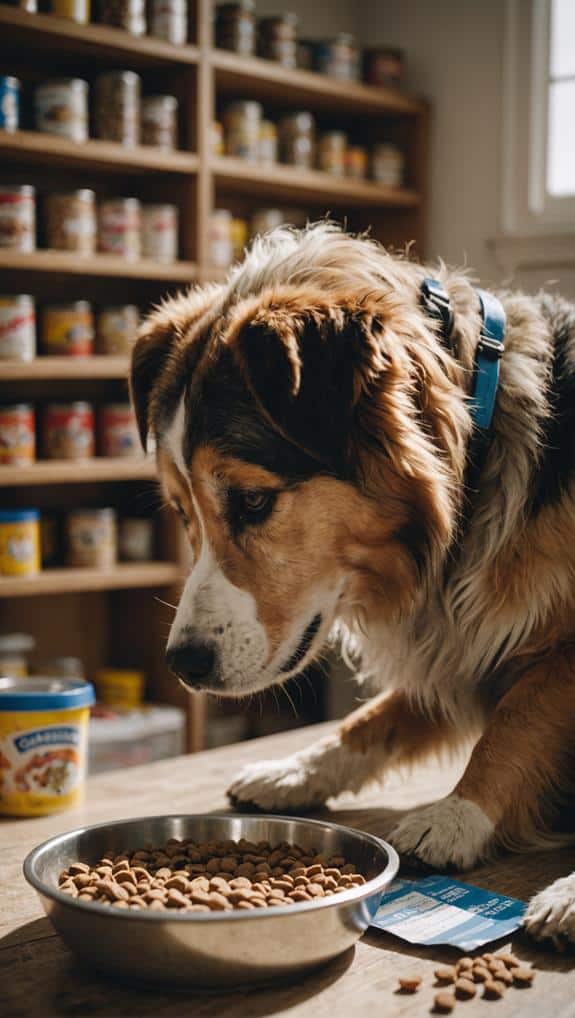When it comes to your pet’s diet, you might unknowingly make common mistakes that can lead to serious digestive issues. For instance, switching their food too quickly can upset their stomach, while not measuring portions can lead to overeating and obesity. You may also be tempted to share your meals, but that can introduce harmful ingredients. Understanding the nuances of proper nutrition is essential, yet many pet owners overlook these factors. What other missteps could be impacting your pet’s health, and how can you avoid them? Additionally, many pet owners may not realize that sudden changes in diet can cause significant gastrointestinal distress, which is why food switches fail for pets. It’s crucial to transition to new foods gradually, ideally over a week or more, to allow your pet’s digestive system to adjust. Furthermore, be vigilant about reading ingredient labels, as some commercial pet foods can contain fillers and artificial additives that may not be suitable for your furry friend, further impacting their health and well-being.
Contents
Measuring Food Accurately

Accurate measurement of your pet's food is crucial for their health and well-being. Many pet owners unknowingly contribute to their furry friends' digestive health issues by not measuring portions correctly. Using non-measuring containers can lead to overeating, which often results in obesity and increases the risk of serious health issues like diabetes and joint problems.
Pet food companies provide guidelines, but these can vary based on your pet's size and activity level, making it important to calculate their specific caloric intake. To guarantee your pet receives the right amount of food, consider using a measuring cup or a food scale. This simple practice helps you avoid free-feeding, which can foster unhealthy eating habits.
By providing precise portions, you can support your pet's weight management and overall health. Remember, every pet is unique, and their dietary needs will differ. Accurate measurement not only prevents overeating but also enhances your pet's digestive health, allowing them to thrive.
Gradual Diet Changes
When changing your pet's diet, it's crucial to do so gradually to avoid upsetting their digestive system. Sudden changes can lead to digestive issues like vomiting and diarrhea, particularly in pets with sensitive digestive systems.
For instance, rabbits, which require a specific diet rich in hay and leafy greens, may experience discomfort if their food is abruptly altered, as rabbit dietary essentials dictate a slow shift for ideal gut health.
To guarantee a smooth shift to a new diet, introduce 20-25% of the new food each day while decreasing the old food over a span of 4-5 days. This gradual shift helps your pet's digestive system adapt to new ingredients, minimizing risks of discomfort such as bloating or gas.
For pets with existing sensitivities or health issues, you might need to extend this adjustment period beyond five days to promote ideal pet health. Taking your time with these dietary changes not only supports your pet's gut health but also reduces stress on their digestive system.
Remember, a well-planned approach can make a significant difference, ensuring that your beloved companion adjusts comfortably to their new diet. By prioritizing a gradual shift, you're safeguarding their well-being and enhancing their overall quality of life.
Avoiding Table Scraps

Feeding your pet table scraps might seem harmless, but it can lead to notable health risks. As a responsible pet parent, it's vital to understand that these scraps often introduce unhealthy levels of fat, sugar, and sodium into your pet's diet. This can greatly increase the risk of obesity and digestive issues, similar to the concerns associated with overfeeding certain fruits like raspberries, which can disrupt a pet's digestive balance.
In addition, certain human foods, such as chocolate, onions, and grapes, are toxic to pets, potentially causing severe health complications a rabbit's dietary safety.
Sharing table scraps can inadvertently reinforce begging behavior, making it harder for your pet to accept their standard dog foods. This behavior can lead to nutritional imbalances, as pets may begin to refuse their well-balanced meals in favor of human food.
Additionally, abrupt changes in diet—like introducing a variety of human foods—can disrupt a pet's digestion, leading to unpleasant symptoms such as vomiting and diarrhea.
To promote your pet's health, focus on providing balanced, specially formulated dog foods. By avoiding table scraps and maintaining routine meal times, you can help guarantee your pet enjoys a healthy, happy life while minimizing digestive issues.
The Risks of Fad Diets
Many pet owners, enthusiastic to provide the best for their furry companions, may be tempted by the latest fad diets that promise miraculous health benefits. However, these diets often lack sufficient scientific backing and may not meet the nutritional standards set by AAFCO. This can lead to potential deficiencies or imbalances in essential nutrients, compromising your pet's overall health.
Additionally, ensuring a balanced diet rich in bunny dental health essentials is essential in preventing complications that arise from poor nutritional choices. Switching to a fad diet can also disrupt your pet's digestive system. Abrupt dietary changes are linked to digestive upset, which may manifest as vomiting or diarrhea.
Moreover, trendy diets often emphasize specific ingredients, potentially exposing your pet to allergens that can worsen existing food allergies or sensitivities.
Relying on marketing claims rather than reputable nutritional guidelines can mislead you, resulting in choices that could lead to serious health problems for your beloved pet. It's important to remember that what works for one pet may not work for another, and the risks associated with fad diets can far outweigh their supposed benefits.
Always prioritize balanced nutrition and take a cautious approach when considering dietary changes for your furry friend. Your pet's health and happiness depend on it.
Importance of Veterinary Guidance

When it comes to your pet's nutrition, veterinary guidance is essential for ensuring their health and well-being.
Tailored nutritional advice can help prevent health complications like obesity and allergies, which often stem from poor dietary choices.
Tailored Nutritional Advice
Maneuvering the complexities of your pet's diet can often be overwhelming, but consulting a veterinarian for tailored nutritional advice is essential for enhancing their digestive health.
Each pet has unique needs based on their life stage, breed, and current health status. A veterinarian can assess these factors to recommend appropriate food that addresses specific dietary requirements.
One of the most common mistakes pet owners make isn't identifying potential food allergens. With professional guidance, you can eliminate these allergens, reducing the risk of chronic digestive disorders like vomiting and diarrhea.
Your veterinarian can also suggest AAFCO-certified diets, ensuring balanced meals that promote overall well-being.
Regular consultations allow for necessary adjustments as your pet's health or lifestyle changes, preventing complications from nutritional deficiencies or excesses.
Early intervention through veterinary advice can lead to timely diagnosis and treatment of underlying health problems contributing to digestive issues.
By prioritizing tailored nutritional advice, you're not just addressing immediate concerns; you're laying the groundwork for your pet's long-term health.
Preventing Health Complications
Understanding your pet's dietary needs lays the foundation for preventing health complications. When considering dietary changes, a veterinary consultation is essential to avoid sudden digestive disturbances like vomiting or diarrhea, especially in sensitive pets.
Regular check-ups can reveal underlying health conditions contributing to chronic digestive symptoms, allowing for timely intervention. Your veterinarian can provide personalized dietary recommendations tailored to your pet's life stage and specific nutritional needs.
This approach not only helps in managing existing health issues but also prevents complications such as obesity and severe digestive disorders. Adopting proper feeding practices—like measuring portions and avoiding harmful ingredients—significantly supports gut health and overall well-being.
If your pet experiences persistent digestive symptoms lasting more than one to two days, seek early veterinary intervention. Acting quickly can improve recovery outcomes and safeguard against serious health problems.
Common Digestive Issues
Digestive issues in pets can be distressing for both animals and their owners, as they often present with symptoms like vomiting and diarrhea. These gastrointestinal disturbances can stem from various causes, including food allergies and dietary indiscretion.
You might notice your pet experiencing a lack of appetite or abdominal bloating, which can indicate discomfort within their digestive tract. In dogs, the tendency to scavenge leads to a higher prevalence of these issues, making it important to monitor their eating habits closely.
When your pet shows signs of distress, such as blood or mucus in their stools, it's vital to seek veterinary attention immediately. Persistent symptoms lasting more than 1-2 days could signal serious underlying health problems that require urgent care.
Addressing these common digestive issues involves not just recognizing the symptoms but also understanding the potential triggers. Being proactive about your pet's diet and habits can help mitigate these concerns, ensuring their digestive health remains ideal.
Identifying Food Allergies

Identifying food allergies in pets is vital for maintaining their overall health and comfort. If you notice symptoms like vomiting, diarrhea, or skin irritations in your dog, it could indicate a food allergy. Common allergens often include proteins such as chicken, beef, dairy, and eggs.
To properly identify these allergies, consider implementing an elimination diet. This method involves introducing a single new protein that your dog has never consumed before, while carefully monitoring for any recurring symptoms.
It's important to recognize these signs early, as unresolved food allergies can lead to chronic digestive issues and more severe health complications down the line. Many food allergy reactions stem from common ingredients found in commercial pet foods, so always check ingredient lists for potential allergens.
Consulting with a veterinarian can provide valuable guidance in tailoring a dietary plan that effectively identifies and manages food allergies. Your vet can help guarantee your dog receives a balanced and appropriate nutritional intake while addressing any allergy concerns.
Managing Stress-Related Digestive Problems
Managing stress-related digestive problems in pets starts with identifying their specific stress triggers, such as loud noises or changes in routine.
You can explore calming techniques like Thundershirts or behavioral therapy to help your pet adapt and feel more secure.
In severe cases, consulting a veterinarian is essential for appropriate support and treatment options tailored to your pet's needs.
Identify Stress Triggers
Pets often show subtle signs of stress that can greatly impact their digestive health. To effectively manage these stress-related issues, you need to identify the triggers affecting your pet. Observe their behavior during changes in their environment, routine, or social interactions.
Common stressors include loud noises, the introduction of new people or animals, and changes in daily schedules. These stressors can lead to anxiety, resulting in gastrointestinal problems like diarrhea or vomiting.
Regularly monitoring your pet's reactions can help pinpoint specific stress triggers. For instance, does your dog hide during thunderstorms or become anxious when visitors arrive? Such behaviors are essential indicators of stress.
If your pet exhibits severe digestive symptoms due to anxiety, don't hesitate to seek consultation with a veterinarian. They can provide tailored strategies and potential treatment options to alleviate your pet's distress.
Implementing calming techniques, such as creating a stable routine or enriching your pet's environment, can also help. Over time, positive socialization experiences and behavioral therapy can notably reduce your pet's anxiety, leading to improved digestive health.
Calming Techniques Options
When your furry friend experiences stress, implementing effective calming techniques can greatly improve their digestive health. Stressors such as environmental changes or routine disruptions can lead to symptoms like diarrhea and vomiting, highlighting the need for vigilant stress management.
Consider using calming coats or Thundershirts, which provide gentle pressure that can comfort anxious pets. These tools may help alleviate stress-induced digestive issues, allowing your pet to feel more secure.
Additionally, behavioral therapy and increased socialization can play important roles in reducing anxiety. Engaging your pet in positive interactions with other animals or people fosters a stable environment, minimizing gastrointestinal disturbances.
Identifying specific stressors in your pet's surroundings is essential. Once you pinpoint these triggers, you can implement changes that greatly enhance their well-being and digestive health.
Whether it's adjusting their space or routine, creating a calm atmosphere can go a long way.
In cases of severe anxiety, don't hesitate to consult your veterinarian. They can provide guidance and, if needed, prescribe anti-anxiety medication to help manage stress-related digestive problems effectively.
Prioritizing your pet's mental health is fundamental for their overall happiness and well-being.
Veterinary Support Importance
Understanding the role of veterinary support can greatly enhance your pet's digestive health, especially when stress-related issues arise. Stress can notably disrupt your pet's gut health, leading to symptoms like diarrhea and vomiting that may require veterinary intervention.
A qualified veterinarian can help identify environmental or routine stressors and provide tailored strategies to mitigate their effects on your pet's digestive system. Tools like calming coats and Thundershirts can be recommended to help reduce anxiety and alleviate stress-induced digestive issues.
These calming aids, combined with behavioral therapy tailored to your pet's specific needs, can help build resilience against stress, promoting better overall health. Regular veterinary check-ups are essential, particularly for pets prone to anxiety.
Ongoing support from your veterinarian not only addresses digestive health but also fosters a deeper understanding of your pet's emotional needs. By collaborating with professionals in veterinary medicine, you're equipping yourself with the knowledge and resources to guarantee your furry friend thrives, both physically and emotionally.
Your commitment to seeking veterinary support shows your dedication to improving your pet's quality of life, making a lasting difference in their health and happiness.
Final Thoughts
In the intricate dance of pet nutrition, each step matters. Just as a skilled dancer must adapt gradually to new routines, your pet's digestive system thrives on careful adjustments and precise measurements. Avoid the tempting allure of table scraps and fad diets, which can lead to missteps. Seek guidance from your veterinarian, the choreographer of your pet's health, ensuring a harmonious balance. By nurturing their diet thoughtfully, you pave the way for a graceful, healthy life.






